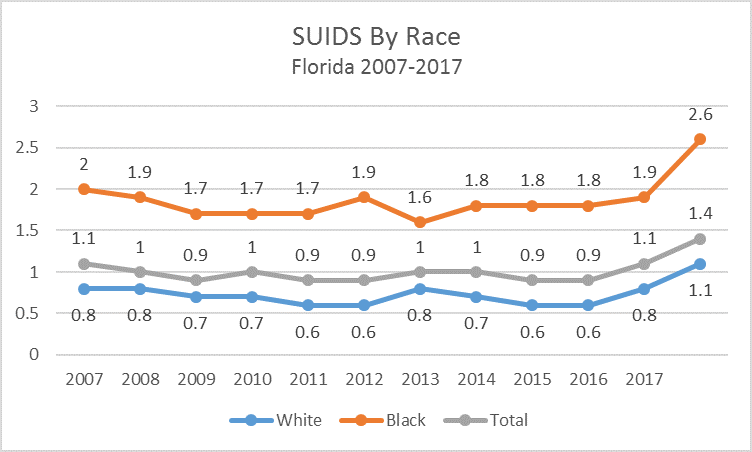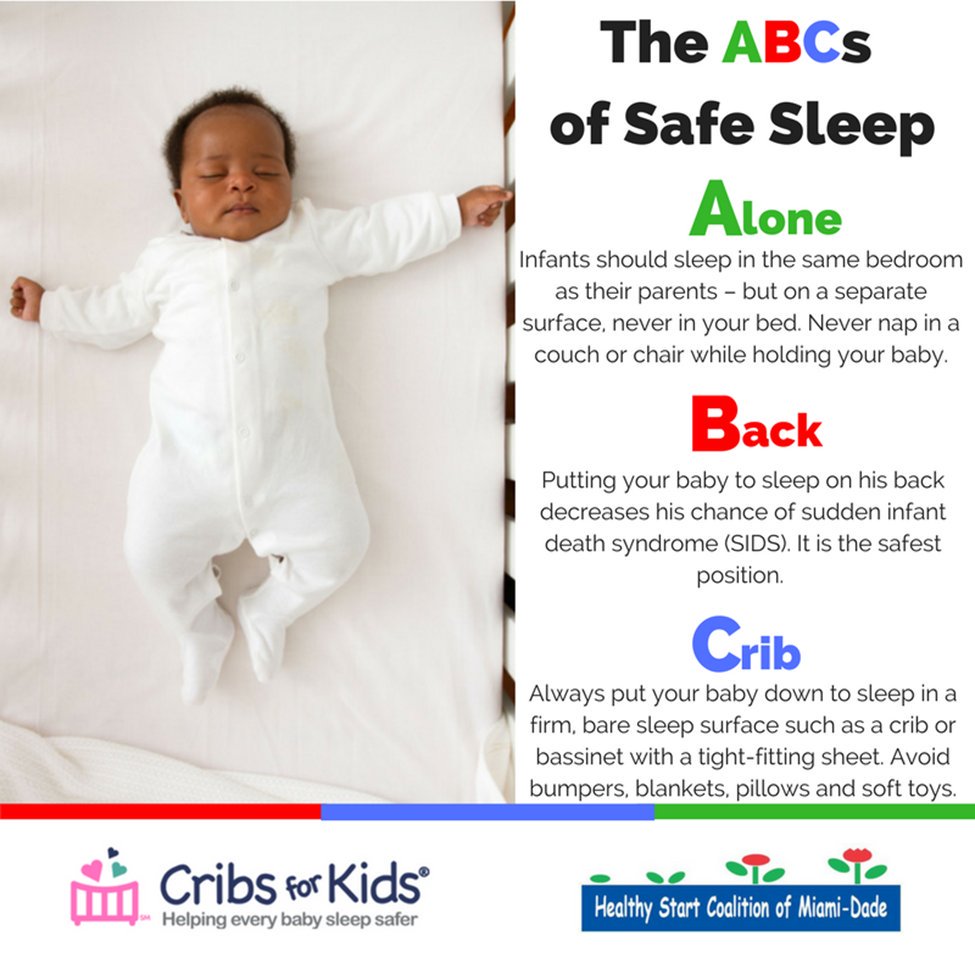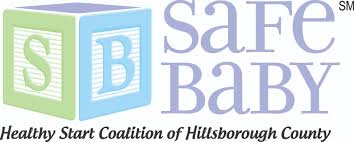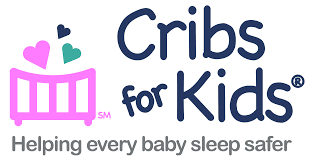Although most babies who die before their first birthday perish soon after delivery, many of the infant deaths that occur later in the first year are the most preventable. The largest contributor to post-neonatal mortality – deaths  between 28 – 364 days – are sleep-related, including SIDS and unintentional deaths caused by unsafe sleep practices, and accidents.
between 28 – 364 days – are sleep-related, including SIDS and unintentional deaths caused by unsafe sleep practices, and accidents.
Post-neonatal deaths comprised 32% of all infant mortality in 2015-2017. A leading cause of death during this period is sudden unexpected infant death (SUID) which includes sudden infant death syndrome (SIDS), accidental suffocation in a sleeping environment, and other deaths from unknown causes. The national SUID rate declined markedly following the release of the American Academy of Pediatrics safe sleep recommendations in 1992, the initiation of the Back to Sleep campaign in 1994, and the release of the Sudden Unexplained Infant Death Investigation Reporting Form in 1996. Since 1999, however, national declines have slowed, and racial disparities persist. Florida has experienced similar trends. Despite widespread public health campaigns and education provided one-on-one to families by health care and other providers, the state saw a disturbing increase in 2017. This increase further exacerbated racial disparities in birth outcomes.
markedly following the release of the American Academy of Pediatrics safe sleep recommendations in 1992, the initiation of the Back to Sleep campaign in 1994, and the release of the Sudden Unexplained Infant Death Investigation Reporting Form in 1996. Since 1999, however, national declines have slowed, and racial disparities persist. Florida has experienced similar trends. Despite widespread public health campaigns and education provided one-on-one to families by health care and other providers, the state saw a disturbing increase in 2017. This increase further exacerbated racial disparities in birth outcomes.
Safe sleep practices in Florida vary significantly by race, age, parent education level, income and Medicaid participation (PRAMS). Sixty-five percent of new families report consistently placing their babies on their backs to sleep. Families are less likely to follow this safe sleep practice if caregivers are black, <19 years old, have <high school education, have incomes <$15,000 a year and are covered by Medicaid. About 22 percent of new families report bed sharing, with a similar risk profile.
Studies show that although expectant and new parents are aware of safe-sleep recommendations they do not always follow them for a variety of reasons from retail marketing of bedding to cultural and family norms.
Reducing SUIDs Through Safe Sleep Interventions What’s Next for Florida provides a comprehensive snapshot of state and local efforts to prevent sleep-related deaths. The 2016 study by the University of South  Florida College of Public Health, funded by the state Department of Health Office of Minority Health & Health Equity, notes a wide range of interventions are being implemented through health care providers, Healthy Start, home visiting programs, child welfare and law enforcement agencies, and parenting support programs. However, there is a need for consistent messaging and a comprehensive approach across the myriad of programs that touch expectant and new families, and other caregivers.
Florida College of Public Health, funded by the state Department of Health Office of Minority Health & Health Equity, notes a wide range of interventions are being implemented through health care providers, Healthy Start, home visiting programs, child welfare and law enforcement agencies, and parenting support programs. However, there is a need for consistent messaging and a comprehensive approach across the myriad of programs that touch expectant and new families, and other caregivers.
“Better implementation, coordination, and alignment of evidence-based culturally appropriate safe sleep interventions are needed in Florida to reduce sleep-related infant deaths. Organizations and systems of care need to work together to ensure clear, consistent messaging that reaches all segments of the community.”
Toward this goal, Healthy Start has joined with state home visiting partners to implement the Safe Baby program created by the Healthy Start Coalition of Hillsborough County to educate and empower parents to protect their babies from leading causes of preventable infant death. With the help of many community partners and hospital nurses, thousands of new parents will now receive consistent education on how to follow safe sleep practices, choose safe caregivers for their children, and prevent Shaken Baby Syndrome.
to implement the Safe Baby program created by the Healthy Start Coalition of Hillsborough County to educate and empower parents to protect their babies from leading causes of preventable infant death. With the help of many community partners and hospital nurses, thousands of new parents will now receive consistent education on how to follow safe sleep practices, choose safe caregivers for their children, and prevent Shaken Baby Syndrome.
Healthy Start Coalitions are also organizing community partnerships to plan and implement a comprehensive strategy for reducing sleep-related deaths.
And, local Healthy Start Coalitions throughout the state are monitoring sleep-related deaths and using findings to target messaging and community outreach activities through Fetal and Infant Mortality Review projects (FIMR).
 Healthy Start coalitions are joining with the state Department of Health in supporting the Cribs for Kids® National Infant Safe Sleep Hospital Certification program. Thirteen Florida hospitals have been certified under this new national initiative which awards recognition to hospitals that demonstrate a commitment to reducing infant sleep-related deaths by promoting best safe sleep practices and by educating others about infant sleep safety.
Healthy Start coalitions are joining with the state Department of Health in supporting the Cribs for Kids® National Infant Safe Sleep Hospital Certification program. Thirteen Florida hospitals have been certified under this new national initiative which awards recognition to hospitals that demonstrate a commitment to reducing infant sleep-related deaths by promoting best safe sleep practices and by educating others about infant sleep safety.
Finally, as part of its work with the national Infant Mortality Collaborative Improvement & Innovation Network (CoIIN), Florida is one of five states selected to pilot a new hospital safety bundle developed as part of the National Action Partnership to Promote Safe Sleep Improvement and Innovation Network (NAPPSS-IIN). The goal of this initiative is to increase the adoption of evidence-based safe infant sleep behaviors and explore its critical link to the promotion of safe breastfeeding practices and behaviors, among infant caregivers.
Coming next: Closing the Gap
